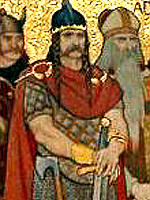Kenneth I of Scotland
| Kenneth MacAlpin | |
|---|---|
 |
|
| King of the Picts | |
| Reign | 843 – 13 February 858 |
| Predecessor | Drest X |
| Successor | Donald I |
| Born | 810 Iona, Scotland |
| Died | 13 February 858 Scotland |
| Burial | Iona |
| Issue among possible others |
|
| House | Alpin |
| Father | Alpín mac Echdach |
Cináed mac Ailpín (Modern Gaelic: Coinneach mac Ailpein), commonly anglicised as Kenneth MacAlpin and known in most modern regnal lists as Kenneth I (810 – 13 February 858), was a king of the Picts who, according to national myth, was the first king of Scots. He was thus later known by the posthumous nickname of An Ferbasach, "The Conqueror". The dynasty that ruled Scotland for much of the medieval period claimed descent from him.
The Kenneth of myth, conqueror of the Picts and founder of the Kingdom of Alba, was born in the centuries after the real Kenneth died. In the reign of Kenneth II (Cináed mac Maíl Coluim), when the Chronicle of the Kings of Alba was compiled, the annalist wrote:
So Kinadius son of Alpinus, first of the Scots, ruled this Pictland prosperously for 16 years. Pictland was named after the Picts, whom, as we have said, Kinadius destroyed. ... Two years before he came to Pictland, he had received the kingdom of Dál Riata.
In the 15th century, Andrew of Wyntoun's Orygynale Cronykil of Scotland, a history in verse, added little to the account in the Chronicle:
Quhen Alpyne this kyng was dede, He left a sowne wes cal'd Kyned,
Dowchty man he wes and stout, All the Peychtis he put out.
Gret bataylis than dyd he, To pwt in freedom his cuntre!
When humanist scholar George Buchanan wrote his history Rerum Scoticarum Historia in the 1570s, a great deal of lurid detail had been added to the story. Buchanan included an account of how Kenneth's father had been murdered by the Picts and a detailed, and entirely unsupported, account of how Kenneth avenged him and conquered the Picts. Buchanan was not as credulous as many and he did not include the tale of MacAlpin's treason, a story from Gerald of Wales, who reused a tale of Saxon treachery at a feast in Geoffrey of Monmouth's inventive Historia Regum Britanniae.
...
Wikipedia
